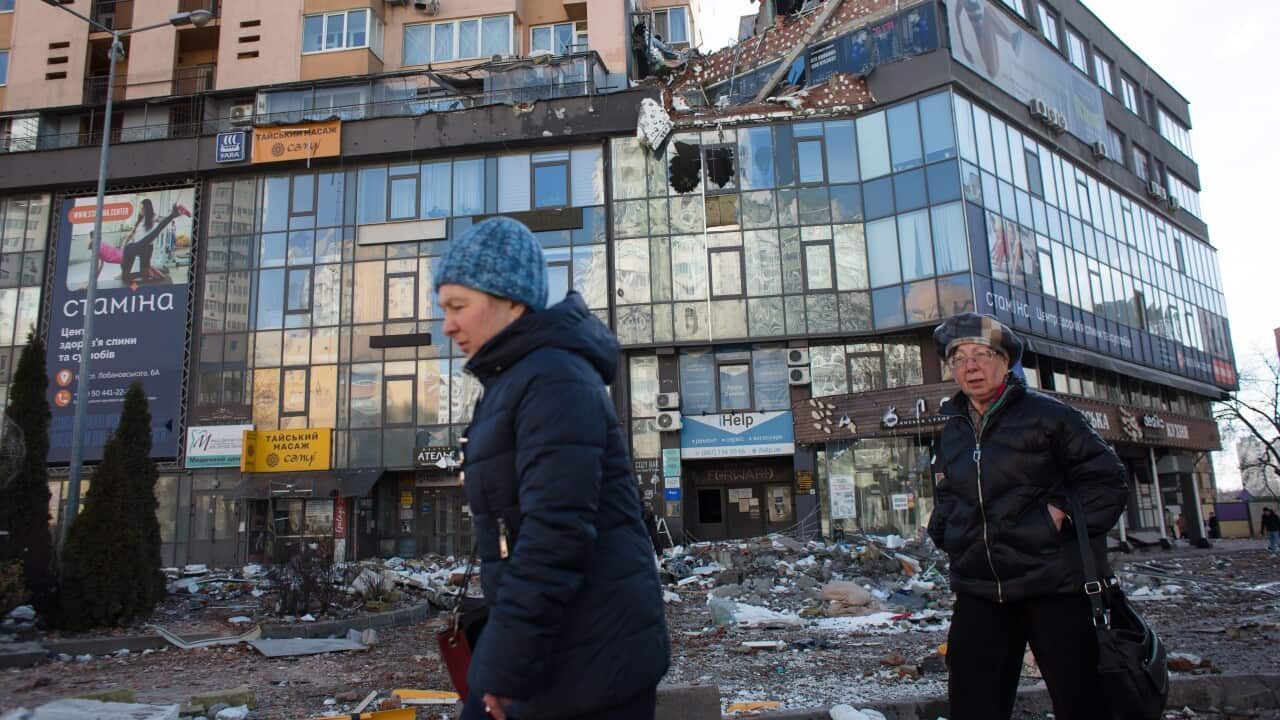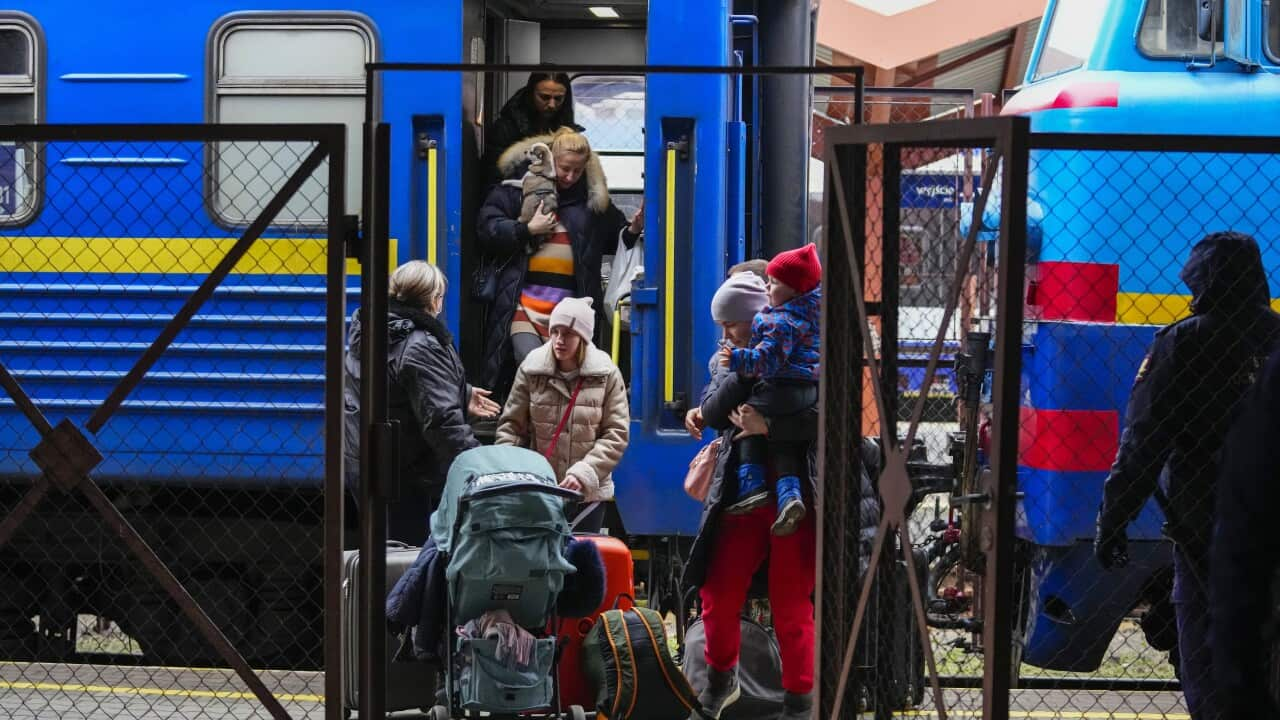Russian missiles have hit the Ukrainian town of Vasylkiv southwest of the capital, Kyiv, setting an oil terminal ablaze, the town's mayor said early on Sunday.
"The enemy wants to destroy everything around," Natalia Balasinovich said in a video posted online.
Photographs and video posted online showed large flames rising under the night sky. The authorities warned residents to be on alert for toxic fumes.
Also on Sunday morning, Russian-backed separatists in Ukraine's Luhansk province said an oil terminal was blown up by a Ukrainian missile in the town of Rovenky, while Russian troops also blew up a natural gas pipeline in the Ukrainian city of Kharkiv, Ukraine's state service of special communications and information protection said.
A mushroom-shaped explosion was shown in a video it posted on the Telegram messaging app.
It was not immediately clear how important the pipeline was and whether the blast could disrupt gas shipments outside the city or the country. Despite the war, Ukraine continues to ship Russian natural gas to Europe.
On Saturday, a defiant President Volodymyr Zelenskyy said Kyiv remained under Ukrainian control as Russian forces renewed their assault, pounding the capital and other cities with artillery and cruise missiles.
A US defence official said Ukraine's forces were putting up "very determined resistance" to the three-pronged Russian advance that has sent hundreds of thousands of Ukrainians fleeing westwards, clogging major highways and railway lines.
"We have withstood and are successfully repelling enemy attacks. The fighting goes on," Mr Zelenskyy said in a video message from the streets of Kyiv posted on his social media.

A Ukrainian soldier in an armoured vehicle waits on the west side of the Ukrainian capital of Kyiv. Source: AFP / DANIEL LEAL/AFP via Getty Images
At least 198 Ukrainians, including three children, have been killed and 1,115 people wounded so far in Russia's invasion, Interfax quoted Ukraine's Health Ministry as saying. It was unclear whether the numbers comprised only civilian casualties.
Interfax later cited the regional administration in Donetsk, eastern Ukraine, saying 17 civilians had been killed and 73 wounded by Russian shelling.
Moscow says it is taking care not to hit civilian sites.
A Ukrainian presidential adviser said about 3,500 Russian soldiers had been killed or wounded. Western officials have also said intelligence shows Russia suffering higher casualties than expected, but such tolls were impossible to verify. Russia has not released casualty figures.
US, Germany sending military aid
Russia's assault is the biggest on a European state since World War Two and threatens to upend the continent's post-Cold War order.
The crisis has galvanised the NATO Western military alliance, which has announced a series of moves to reinforce its eastern flank. While NATO has said it will not deploy troops to Ukraine, a string of countries are sending military aid.
US President Joe Biden approved the release of up to $350 million worth of weapons from the country's stocks, while Germany, in a shift from its long-standing policy of not exporting weapons to war zones, said it would send anti-tank weapons and surface-to-air missiles.
and wants to join NATO and the EU, goals Russia opposes.
Mr Putin has said he must eliminate what he calls a serious threat to his country from its smaller neighbour, accusing it of genocide against Russian-speakers in eastern Ukraine - a charge dismissed by Kyiv and its Western allies as baseless propaganda.
'Saboteur groups active in Kyiv'
The United States has observed more than 250 launches of Russian missiles, mostly short-range, at Ukrainian targets, a US defence official said.
"We know that (Russian forces) have not made the progress that they wanted to make, particularly in the north. They have been frustrated by what they have seen is a very determined resistance," the official said, without providing evidence.
Chechen leader Ramzan Kadyrov, a close Putin ally, said on Saturday his fighters were also deployed in Ukraine. He said Russian forces could easily take Kyiv and other large cities but their task was to avoid loss of life.
Kyiv's mayor Vitali Klitschko said there was no major Russian military presence in the capital, but that saboteur groups were active. The metro system was being used as a shelter for citizens and trains have stopped running, he said.
Klitschko, a former world heavyweight boxing champion said 35 people, including two children, had been wounded overnight and that he was imposing a curfew from Saturday evening until Monday morning.
Meanwhile, Russia's Defence Ministry said its forces had captured Melitopol, a city of 150,000 in southeastern Ukraine. Ukrainian officials did not comment and Britain cast doubt on the report.
If confirmed, it would be the first significant population centre the Russians have seized.

People on foot and in cars move to cross from Ukraine to Poland at the Korczowa-Krakovets border crossing. Source: AFP / DIMITAR DILKOFF/AFP via Getty Images
Thousands flee to neighbouring countries
About 100,000 people have crossed into Poland from Ukraine since Thursday, including 9,000 who have entered since 7am on Saturday, Polish Deputy Interior Minister Pawel Szefernaker said.
"The most important thing is that people survive," said Katharina Asselborn, wiping away tears while waiting at the Polish border for her sister, aunt and her three children to arrive from their home in Ukraine's Black Sea port of Odessa.
"The last 30 kilometres to the border they went on foot."
Ukrainians were also crossing the borders into Hungary, Romania and Slovakia.

People holding a large Ukrainian flag gather for a "Stand With Ukraine" rally in Times Square, New York. Credit: Alexi Rosenfeld/Getty Images
Sanctions enacted, anti-war protests held
Western nations have also announced new sanctions on Russia, including blacklisting its banks and banning technology exports.
They have stopped short of forcing Russia out of the SWIFT system for international bank payments, though Germany's foreign and economy ministers and French presidential official indicated on Saturday that such a move may come soon.
Several European countries, including Russia's Baltic neighbours Lithuania and Latvia, said they were closing their airspace to Russian airliners.
The invasion is also affecting Russia's sports, cultural and other links. On Saturday, Poland and Sweden said their national soccer teams would not play their World Cup qualifiers against Russia next month.
Protests against the war took place in Berlin, Bern, London, Tokyo, Sydney and other cities worldwide.
Abramov Kiril, a 33-year-old Ukrainian living in Romania who still has grandparents in southern Ukraine, was among around 1,000 people demonstrating against Mr Putin's move outside the Russian embassy in Bucharest.
"If they will not stop him in Ukraine he will go forward," he said. "Somehow, together with everybody, with all the countries in Europe and ... all the world, we need to stop him."










